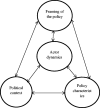Why did Ghana's national health insurance capitation payment model fall off the policy agenda? A regional level policy analysis
- PMID: 33956959
- PMCID: PMC8227458
- DOI: 10.1093/heapol/czab016
Why did Ghana's national health insurance capitation payment model fall off the policy agenda? A regional level policy analysis
Abstract
Provider payment reforms, such as capitation, are very contentious. Such reforms can drop off the policy agenda due to political and contextual resistance. Using the Shiffman and Smith (Generation of political priority for global health initiatives: a framework and case study of maternal mortality. Lancet 2007; 370 1370-9) framework, this study explains why Ghana's National Health Insurance capitation payment policy that rose onto the policy agenda in 2012, dropped off the agenda in 2017 during its pilot implementation in the Ashanti region. We conducted a retrospective qualitative policy analysis by collecting field data in December 2019 in the Ashanti region through 18 interviews with regional and district level policy actors and four focus group discussions with community-level policy beneficiaries. The thematically analysed field data were triangulated with media reports on the policy. We discovered that technically framing capitation as a cost-containment strategy with less attention on portraying its health benefits resulted in a politically negative reframing of the policy as a strategy to punish fraudulent providers and opposition party electorates. At the level of policy actors, pilot implementation was constrained by a regional level anti-policy community, weak civil society mobilization and low trust in the then political leadership. Anti-policy campaigners drew on highly contentious and poorly implemented characteristics of the policy to demand cancellation of the policy. A change in government in 2017 created the needed political window for the suspension of the policy. While it was technically justified to pilot the policy in the stronghold of the main opposition party, this decision carried political risks. Other low- and middle-income countries considering capitation reforms should note that piloting potentially controversial policies such as capitation within a politically sensitive location can attract unanticipated partisan political interest in the policy. Such partisan interest can potentially lead to a decline in political attention for the policy in the event of a change in government.
Keywords: Ghana; Provider payment; Shiffman and Smith; capitation; policy analysis; regional level.
© The Author(s) 2021. Published by Oxford University Press in association with The London School of Hygiene and Tropical Medicine.
Figures
References
-
- Abiiro GA, McIntyre D.. 2013. Universal financial protection through National Health Insurance: a stakeholder analysis of the proposed one-time premium payment policy in Ghana. Health Policy and Planning 28: 263–78. - PubMed
-
- Aboagye AQQ. 2013. Capitation in HealthCare financing in Ghana. East African Medical Journal 90: 156–63. - PubMed
-
- Agyepong IA, Adjei S.. 2008. Public social policy development and implementation: a case study of the Ghana National Health Insurance scheme. Health Policy and Planning 23: 150–60. - PubMed
-
- Alhassan I. 2011. Ex-KATH CEO chides government over NHIS Capitation Policy. Ghanaian Chronicle.
MeSH terms
LinkOut - more resources
Full Text Sources
Other Literature Sources


